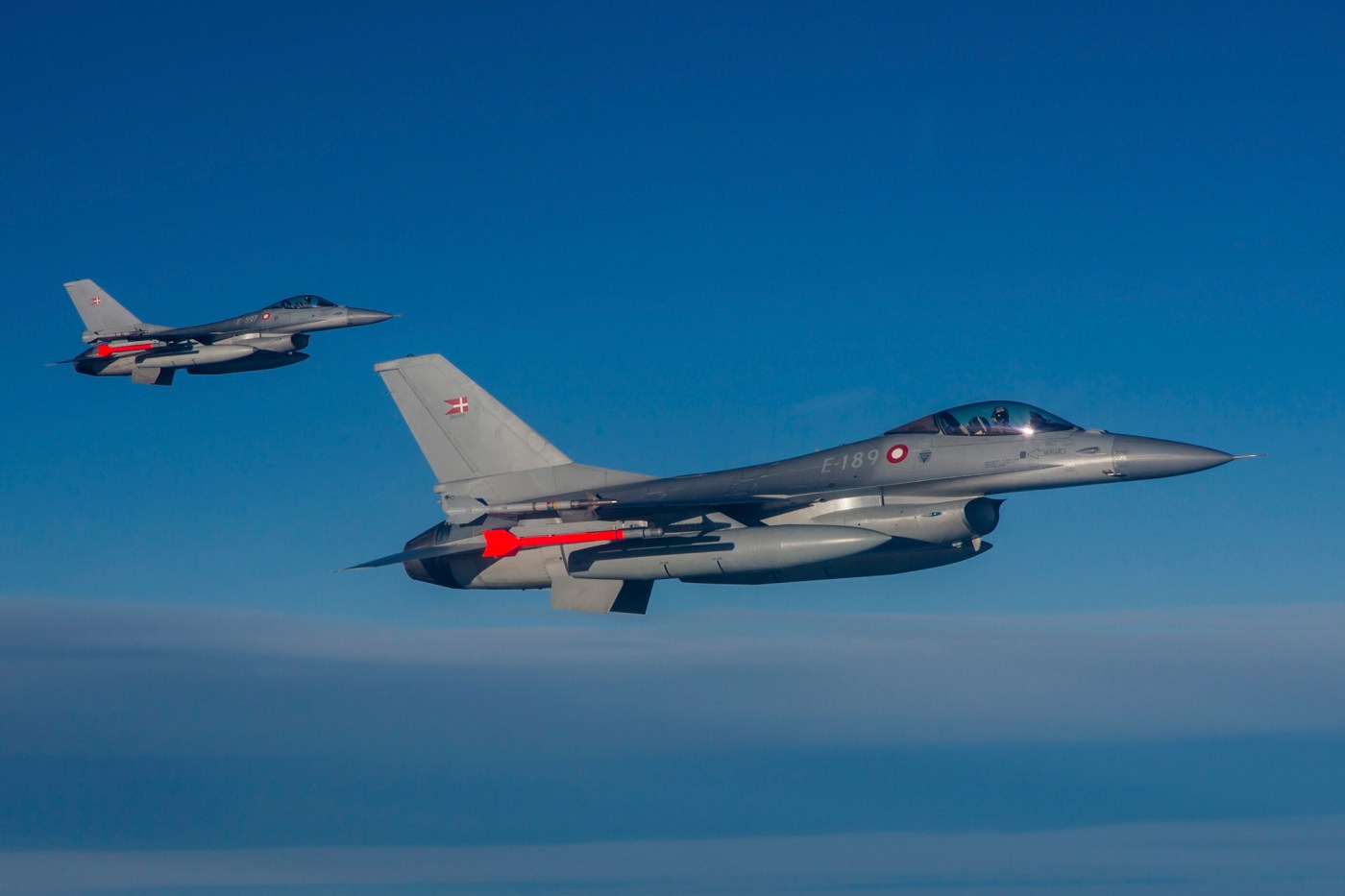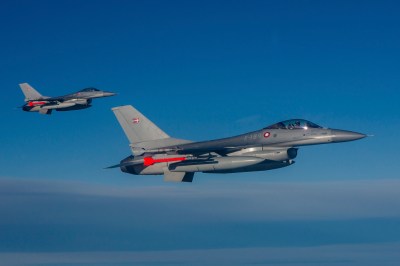After sitting on Ukraine’s requests for months, the Biden administration reversed course last week by formally greenlighting the transfer of F-16s to the war-torn country from Denmark and the Netherlands’ arsenals. On Thursday, Norwegian Prime Minister Jonas Gahr Stoere announced plans to do the same. Ukrainian President Volodymyr Zelensky has welcomed the news, but analysts say the yearlong delay in allowing the U.S.-made aircraft to reach the battlefield—a process likely to take months—risks prolonging the conflict at a crucial juncture.
That’s bad for Ukraine’s current prospects, but could be even worse for its future ones: U.S. concerns about such a stalemate have only emboldened the growing isolationist faction within the Republican Party, which is threatening to cut off additional aid to Ukraine and push Kyiv to accept a peace deal that some fear may favor Moscow.
The stark divide over the issue within the GOP was clear in Milwaukee Wednesday night, as 2024 hopefuls clashed on the value of continued military assistance to Ukraine in its fight against Russia.
“We are protecting against an invasion across somebody else’s border when we should use those same military resources to prevent an invasion of our own southern border here in the United States of America,” said Vivek Ramaswamy, a biotech entrepreneur. “I find it offensive that we have professional politicians out on the stage that will make a pilgrimage to Kyiv—to their pope, Zelensky—without doing the same thing for people in Maui or the south side of Chicago or Kensington.”
The line earned cheers from the debate audience, but jeers from Ramaswamy’s opponents. While former New Jersey Gov. Chris Christie highlighted Russian war crimes, former Vice President Mike Pence emphasized the importance of “peace through strength” to prevent the U.S. from being drawn into a broader conflict. Nikki Haley, the former governor of South Carolina and former U.S. ambassador to the United Nations, pointed to the strengthening ties between Moscow and Beijing—which Ramaswamy claimed U.S. policy was responsible for—as a reason for continued aid to Ukraine. “A win for Russia is a win for China. We have to know that Ukraine is the first line of defense for us,” she said in response to Ramaswamy’s remarks. “You have no foreign policy experience, and it shows.”
Some in the audience applauded Haley, but Ramaswamy’s stance is undoubtedly the more popular one among Republican primary voters. In a CNN/SSRS poll published this month, 71 percent of the Republicans surveyed said Congress should not authorize new funding for Ukraine. It’s a far cry from the spring of 2022, when just 17 percent of Republican and Republican-leaning respondents in a Pew Research survey said the U.S. was doing too much to help the embattled country. In the year and a half since, the United States has authorized tens of billions of dollars in support of Ukraine’s war effort.
Republicans’ waning support for Ukraine brings the party more in line with Donald Trump, absent from Wednesday’s debate. In an interview with former Fox News host Tucker Carlson posted minutes before the debate began, however, the former president lambasted Joe Biden for getting the U.S. involved in the “horrible, horrible war” between Ukraine and Russia. He’s previously argued the U.S. has given Ukraine too much ammunition, and vowed to broker a settlement with Russia within “24 hours” of returning to office.
Such a deal would be impossible to reach without surrendering large swaths of Ukraine currently occupied by Russia, a non-negotiable for Zelensky’s government. As the Ukrainians’ counteroffensive comes up against entrenched Russian forces, officials in Kyiv are thinking long-term, looking to secure an arrangement that creates lasting deterrence.
But maintaining a functional air force is crucial to that goal, which is what could make the F-16s so important going forward.
“It’s indisputable that it’s just a matter of time until Ukraine is going to need to replace its existing fleet of aircraft, either because they are destroyed in combat or because they just get so old and can no longer be safely flown despite the best efforts of maintainers and engineers,” Bradley Bowman, the senior director at the Foundation for Defense of Democracies’ Center on Military and Political Power, tells The Dispatch. “As long as Kyiv continues to exist, it’s going to need replacements, it’s going to need aircraft, it’s going to need something like the F-16.”
Ukraine’s recent setbacks on the front line have underscored its lack of airpower, as Russian attack helicopters slow Ukrainian advances. Russia’s fixed-wing aircraft, namely the Su-35S and Su-30SM, also outperform Ukraine’s aging arsenal of MiG-29 and Su-27 fighter jets. F-16s would go a long way in giving Kyiv the air cover necessary to sustain ground operations, as well as supplement existing air defenses to protect civilians and infrastructure, Ukrainian officials and defense analysts say.
“In the 21st century, no land force—however potent and combat-capable—can prevail without a bare minimum of air superiority,” says Can Kasapoğlu, a defense expert at the Hudson Institute. He went on to argue that the current configuration has left Ukrainian armored units “dangerously exposed.”
But getting the Western-made jets to the battlefield is no simple task. Deploying the F-16s, at least 42 of them by Zelensky’s count, will require scores of Ukrainian pilots to learn how to fly them in combat—an immense undertaking already underway in Europe and set to begin at U.S. military bases in October.
“Although we do not have specific numbers to share at this time in regards to how many Ukrainians will participate in this training, we do anticipate it will include several pilots and dozens of maintainers,” Pentagon spokesman Brig. Gen. Pat Ryder told reporters on Thursday.
But the United States’ role going forward will involve more than just training. The F-16, a U.S.-made jet, will require spare parts and logistical support for a long time to come. The aircraft will also work best when armed with U.S.-made AGM-158 JASSM air-launched cruise missiles—another possible sticking point for some Republicans.
The GOP includes plenty of traditional war hawks: Senate Minority Leader Mitch McConnell has long advocated for taking a hardline with Moscow, arguing that support for Ukraine’s defensive fight helps degrade the threat posed by Russian conventional forces. Sen. Roger Wicker, the top Republican on the Senate Armed Services Committee, has led the charge in rallying congressional support for military aid to the country. In the House, Rep. Michael McCaul, the Republican chairman of the House Foreign Affairs Committee, has frequently called on the administration to approve the transfer of advanced Western weapons systems to Ukraine, including F-16s and long-range Army Tactical Missile Systems (ATACMS).
But others are “wittingly or unwittingly echoing the talking points of Vladimir Putin,” Bowman says. “We have a free people defending their homes against an unprovoked invasion. They’re not asking Americans to fight for them, they’re simply asking for the means to defend their home.”
“For 3.5 percent of what we’re spending on the Pentagon during the same period, we are dealing body blows to the second leading conventional military threat our country confronts. And we’re sending a message to authoritarian bullies around the world that America is not neutral when one tries to redraw international borders with military force,” he added. “That is a bargain, that is a wise investment, that is not charity.”
Ironically, Kasapoğlu argues, policymakers dragging their feet on arming Ukraine are actually the ones dragging the conflict out further.
“This is like the administration of a cortisone shot,” he says. “Sometimes the administration of the medical protocol can be right, but if you do not administer it in time you won’t see your patient’s recovery.”







Please note that we at The Dispatch hold ourselves, our work, and our commenters to a higher standard than other places on the internet. We welcome comments that foster genuine debate or discussion—including comments critical of us or our work—but responses that include ad hominem attacks on fellow Dispatch members or are intended to stoke fear and anger may be moderated.
With your membership, you only have the ability to comment on The Morning Dispatch articles. Consider upgrading to join the conversation everywhere.